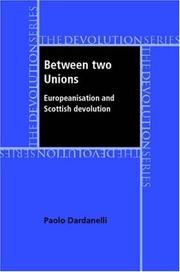| Listing 1 - 3 of 3 |
Sort by
|
Book
ISBN: 9780773551527 0773551522 9780773552531 9780773552548 0773552537 0773552545 Year: 2017 Publisher: Montreal: McGill-Queen's university press,
Abstract | Keywords | Export | Availability | Bookmark
 Loading...
Loading...Choose an application
- Reference Manager
- EndNote
- RefWorks (Direct export to RefWorks)
"Since 1950, devolution reforms have been widespread across Western Europe, leading to constitutional transformation in Belgium, Italy, Spain, and the United Kingdom, as well as the potential for state break-up, as witnessed by independence referendums in Scotland and Catalonia. Over the same period, European integration has transferred power upwards to what is now the European Union. The simultaneous occurrence of these seemingly contradictory trends raises fundamental questions. Is state restructuring a uniform process? Has it been fuelled by European integration and, if so, how? Restructuring the European State uses a comparative analysis to present a systematic investigation of the connections between European integration and state restructuring. Paolo Dardanelli argues that there are two distinct dynamics of state restructuring: "bottom up," where one or more regions demand self-government, and "top down," where the central government decides to devolve power. Through quantitative analyses of thirteen key phases of state restructuring in Belgium, Denmark, France, Italy, Spain, and the United Kingdom he shows that European integration has a powerful influence only in bottom up cases. Dardanelli points to a striking paradox of integration, whereby an ethos of Europe growing ever closer to union has become associated with fragmentation, divergence, and increased complexity, rather than a seamless system of multilevel governance. Innovative and rigorously researched, Restructuring the European State marks a major advance in our understanding of contemporary European politics."--
European federation --- Federation of Europe --- Pan Europa movement --- Paneuropean federation --- United States of Europe (Proposed) --- European Union. --- E.U. --- European Union countries --- Politics and government. --- EU (European Union) --- Evropské unie --- Europäische Union --- Euroopa Liit --- EL (European Union) --- Unión Europea --- UE (European Union) --- Union européenne --- Unione europea --- Eiropas Savienības --- Europos Sajunga --- Európai Unió --- Unjoni Ewropea --- Europese Unie --- Evropeĭski sŭi︠u︡z --- Европейски съюз --- Evrosŭi︠u︡z --- Евросъюз --- Unia Europejska --- União Europeia --- Európska únia --- Evropska unija --- I︠E︡vropeĭsʹkyĭ soi︠u︡z --- I︠E︡vrosoi︠u︡z --- Euroopan unioni --- Europeiska unionen --- Aontas Eorpach --- Ittiḥād al-Ūrūbbī --- Liên minh Châu Âu --- 欧洲联盟 --- Avropa İttifaqı --- Evrópusambandið --- Ittiḥādīyah-i Urūpā --- اتحاديه اروپا --- Yekîtiya Ewropayê --- Eurōpaikē Henōsē --- E.E. (European Union) --- EE (European Union) --- Avrupa Birliği --- AB (European Union) --- Europeiske union --- Sahabhāb ʻAȳrʺup --- Federal government --- Regionalism (International organization) --- European Union --- Politics and government --- International relations. Foreign policy --- European federation. --- European Union countries - Politics and government

ISBN: 1781701393 1847792138 9781847792136 9781781701393 0719070805 9780719070808 9780719070808 0719070805 Year: 2006 Publisher: Manchester Manchester University Press
Abstract | Keywords | Export | Availability | Bookmark
 Loading...
Loading...Choose an application
- Reference Manager
- EndNote
- RefWorks (Direct export to RefWorks)
This book is the first in-depth comparative study of Scottish devolution and the first to analyse the impact of the European dimension. With focus on the periods leading up to the referendums in 1979 and 1997, it investigates positions and strategies of political parties and interest groups and how these influenced constitutional preferences at mass level and ultimately the referendum results. Based on rigorous analysis of an extensive body of quantitative and qualitative sources, it builds a ground-breaking argument that challenges the widespread thesis that support for devolution was
Scotland --- Politics and government --- Conservative rule. --- European dimension. --- Scottish devolution. --- changing attitudes. --- comparative study. --- constitutional preferences. --- independence. --- interest groups. --- political parties. --- referendum.
Book
ISBN: 1003038719 1003038719 1000336875 Year: 2021 Publisher: Abingdon, Oxon, England ; New York, New York : Routledge,
Abstract | Keywords | Export | Availability | Bookmark
 Loading...
Loading...Choose an application
- Reference Manager
- EndNote
- RefWorks (Direct export to RefWorks)
"This book offers an up-to-date assessment of the state of Switzerland-EU relations with the aim of drawing lessons from the Swiss experience to shed light on the challenges facing the UK post-Brexit and, more broadly, on how non-member states can adapt to 'integration without membership'. The book covers the main issues in the Swiss experience of dealing with the EU over the last 30 years. These include the determinants of the 1992 vote, the architecture of the bilateral agreements signed since then, the economic interests at stake, the role played by immigration, the impact on the country's federal system, the political, social, and cultural factors shaping attitudes to integration, and how the 'Swiss model' has featured in the discourse about Brexit. The concluding chapter identifies the key lessons Switzerland's experience offers for the British debate on the country's relations with the EU post-Brexit. This book will be of key interest to scholars and students of European Union politics, European politics, Swiss Politics, British Politics, Brexit, and more broadly to international relations"--
Diplomatic relations. --- European Union --- Switzerland --- Great Britain --- European Union countries --- Foreign relations
| Listing 1 - 3 of 3 |
Sort by
|

 Search
Search Feedback
Feedback About UniCat
About UniCat  Help
Help News
News